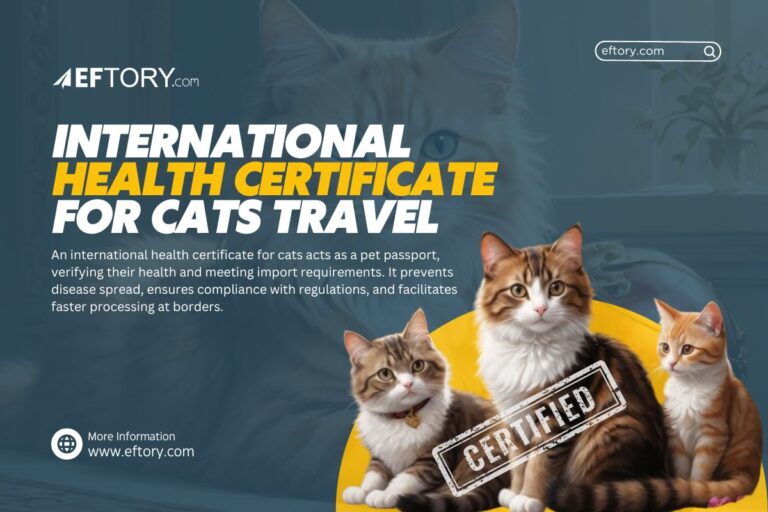Summary: An international health certificate for cats acts as a pet passport, verifying their health and meeting import requirements. It prevents disease spread, ensures compliance with regulations, and facilitates faster processing at borders.
International Health Certificate for Cats:
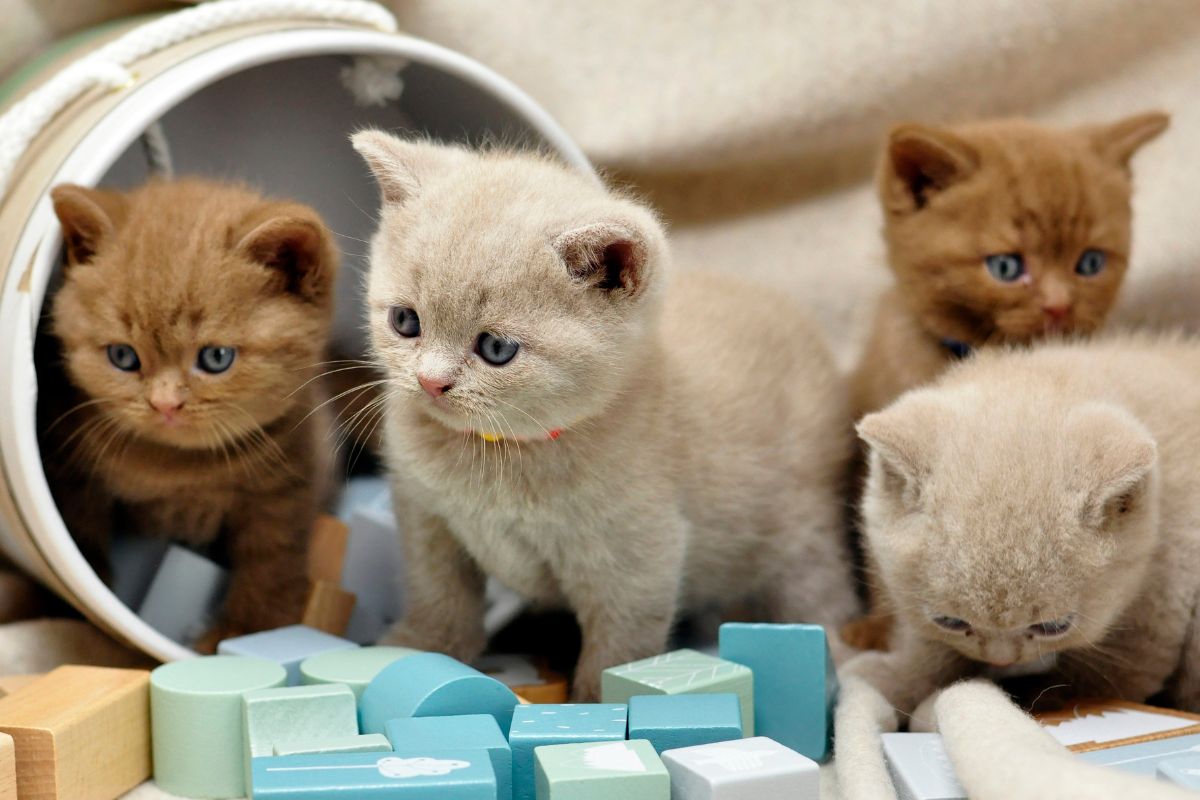
An international health certificate for cats is essentially a pet passport. It’s an official document issued by a licensed veterinarian that verifies your cat is healthy and meets the specific import requirements of the country you’re traveling to. Below there is the importance of international health certificates for pet travel.
- Prevents the Spread of Disease: Cats can carry diseases that might be new or not common in the country you are going to travel to. The certificate assures that your cat has received the necessary vaccinations to protect other cross-border animals from these diseases.
- Compliance with Regulations: Every country has its animal import regulations. The health certificate validates that your cat meets these requirements, preventing delays or even denial of entry at the border.
- Faster Processing: Having a valid health certificate simplifies the immigration process for your cat upon arrival.
Prevent Cross-Border Animal Disease Transmission:
As mentioned above this certificate confirms that your cat has received necessary immunizations against serious diseases including rabies. This helps in preventing the transmission of such fatal diseases among the new population of animals.
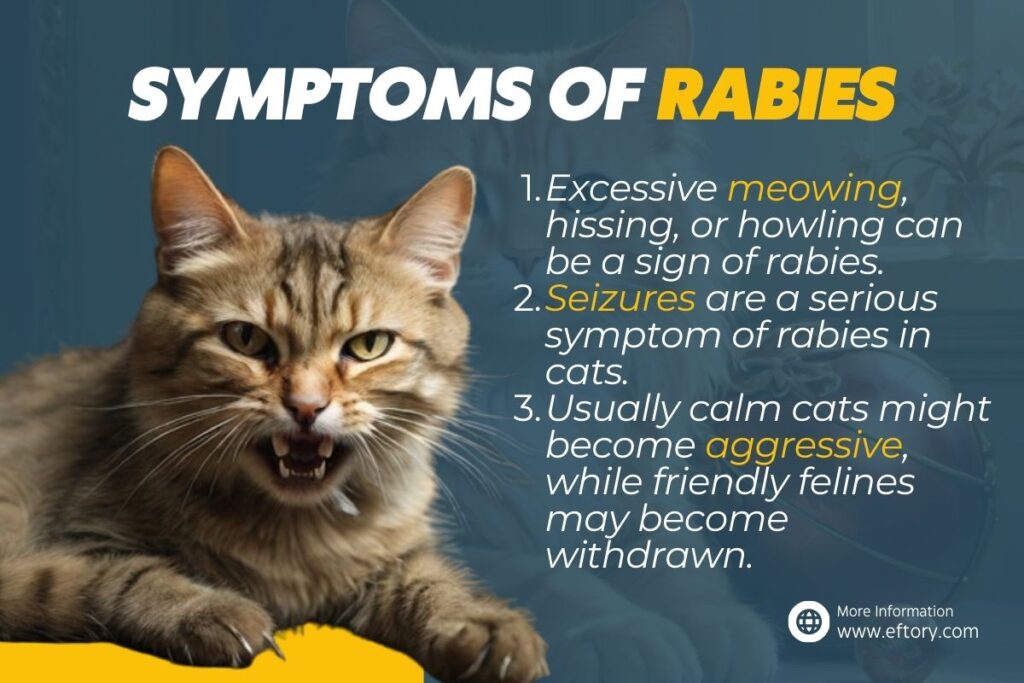
- Early Health Problem Identification: Checking for parasites and other health issues is frequently part of the veterinary checkup necessary to obtain the certificate. Upon their arrival, these ailments can be stopped from spreading to other animals by early detection and treatment.
- Protecting Native Wildlife: Many countries have unique ecosystems with native animal populations that might be vulnerable to diseases from outside. The certificate helps safeguard these animals by ensuring incoming cats don’t carry illnesses that could be devastating for them.
- Global Public Health: Certain diseases can transfer from animals to humans (zoonosis). By ensuring that your cat is healthy, the certificate indirectly contributes to public health efforts in the destination country.
International health certificates are like gatekeepers, which ensure that only healthy cats with proper vaccinations can enter a new country. This safeguards the health of all animals, domestic and wild, and reduces the possibility of starting disease epidemics. It’s very beneficial for pet travel, animal welfare, and public health on a global scale.
Cat Health Certificate Information:
Your veterinarian issues a health certificate certifying your cat’s health and ensures that your pet is free from parasites and diseases that can transfer to humans. The certificate should include:
- Cat’s number and species.
- Breed, sex, age, color, or identification method (microchip, tattoo, etc.).
- Owner’s name and address or house details.
- Transport origination and destination addresses.
- Vaccination details: manufacturer, vaccination dates, lot numbers, expiration dates.
- Veterinary attestations:
- Your cat hasn’t belonged to a rabies-affected area or is not under rabies quarantine.
- Your cat hasn’t ever been exposed to rabies.
Make sure that your pet’s health certificate is issued in English or bilingual, with English included as one of the languages. Additionally, some countries may require translation of the certificate into their native language, such as many South and Central American nations. Certain countries provide their own specific health certificates, including European Union Member States, South Africa, Singapore, New Zealand, and Australia.
When the destination country doesn’t provide its own health certificate, an official certificate is issued and endorsed by a governmental agency responsible for regulating the import and export of live animals. This agency, usually part of the Ministry or Department of Agriculture, ensures compliance with health and safety standards for animal transportation.
Health Certificate Price:
Generally, expect to pay anywhere from $50 to $200 for the health certificate itself. However, this can vary depending on different factors like location, examination complexity, and clinic policies.
Required Documents:
To obtain an international health certificate for your cat, you’ll typically need to provide several documents to your veterinarian. Here’s a list of the most common requirements:
- Proof of Rabies Vaccination: This is the most necessary document. It is proof that your cat has received a rabies vaccination that meets the specific requirements of the destination country.
- Microchip Implantation: Many countries require cats to be microchipped for identification purposes. The certificate should include the microchip number and confirmation that it’s functioning properly.
- Past Medical Records: While not always mandatory, providing your cat’s past medical records can be helpful. This demonstrates your cat’s overall health history and any previous vaccinations or treatments received.
In addition to these essential documents, some countries might have additional requirements. These could include:
- Parasite Prevention Treatments: It may be required to provide evidence that your cat has recently taken medicine for parasite prevention (such as flea and tick treatments).
- Blood Tests: To check for infections like feline distemper or rabies, some nations may need specific blood tests.
Tip: It’s essential to research the specific requirements of the country you’re traveling to well in advance. This will ensure you have all the necessary documentation and avoid any delays or complications at the border.
Where I Can Get a Health Certificate For My Cat:
A professional veterinarian who has been certified to provide foreign health certificates can provide you with one for your cat. These vets usually work in clinics or animal hospitals that accommodate pet travelers from other countries.
Here’s how to find a veterinarian accredited to issue international health certificates:
- Search online: A simple web search for “veterinarians issuing international health certificates near me” should provide results in your area.
- Contact your regular veterinarian: Your veterinarian might be able to issue the certificate themselves or recommend a colleague who is Accredited.
- USDA website: The United States Department of Agriculture (USDA) website provides a searchable database of accredited veterinarians by location.
USDA endorsement (if Applicable):
A USDA endorsement on your pet’s health certificate is a federal seal of approval when it comes to international pet travel from the United States.
Why is a USDA endorsement needed?
The USDA (United States Department of Agriculture) endorsement confirms the fact that the health certificate for your pet complies with the destination country’s animal import laws. It essentially serves as a federal certification that your pet satisfies the health requirements established by the US and the country you are visiting.
When is a USDA endorsement required?
In most cases, a USDA endorsement is needed for pets leaving the US. However, there are a few exceptions:
- Traveling to Canada or Mexico: For land travel to Canada or Mexico, a USDA endorsement might not always be necessary. However, it’s still recommended to check with the Canadian Food Inspection Agency (CFIA) or the Mexican Ministry of Agriculture (SAGARPA) for the latest requirements.
- Military travel: Active-duty military staff with pets traveling to certain countries (usually with specific prior arrangements) might be exempt from USDA endorsement if a military veterinarian issues and endorses the health certificate.
Point to be noted: An international health certificate serves as a current snapshot of your pet’s health at the time of travel. Countries require them to be issued within a specific timeframe (usually days or weeks) before your departure to ensure your pet hasn’t contracted any illnesses between the examination and arrival.
How does your veterinarian help with the USDA endorsement?
Your veterinarian plays a vital role in facilitating the USDA endorsement process.
- Issuing the health certificate: The veterinarian will first conduct the required examination and ensure the health certificate is filled out correctly based on the destination country’s regulations.
- Completing the endorsement application: They will likely help you in completing the application for USDA endorsement, which might involve additional paperwork.
- Forwarding documents to USDA: Once everything is done correctly, your veterinarian will typically submit the health certificate and endorsement application to the appropriate USDA endorsement office on your behalf.
You Might be Interested in How to Avoid Jet Lag When Traveling To Europe
How do I Get My Cat’s Health Certificate Endorsed by USDA?
1. Work with your accredited veterinarian:
- Make an appointment with a veterinarian accredited to issue international health certificates. They will perform a thorough examination to ensure your pet is healthy and fit for travel.
- They will help you in collecting the required documents, typically including:
- Proof of rabies vaccination meeting the destination country’s requirements.
- Microchip implantation confirmation (if required by the destination country).
- Past medical records (helpful, but not always mandatory).
- Additional test results (blood tests, stool tests) if mandated by the destination country.
- Once the examination is complete and documents are gathered, the veterinarian will issue the international health certificate for your pet.
2. Submit the endorsement application (choose one option):
Option 1: Veterinarian-Assisted Submission (Recommended):
Many veterinarians can handle the endorsement process on your behalf. They will likely complete the USDA endorsement application and submit it electronically along with your pet’s health certificate to the appropriate USDA endorsement office.
Option 2: Direct Submission to USDA:
- If your veterinarian doesn’t offer endorsement submission assistance, you can submit the application and health certificate yourself. You’ll need to:
- Download the application form from the USDA website by searching APHIS Form 7001 in the search bar.
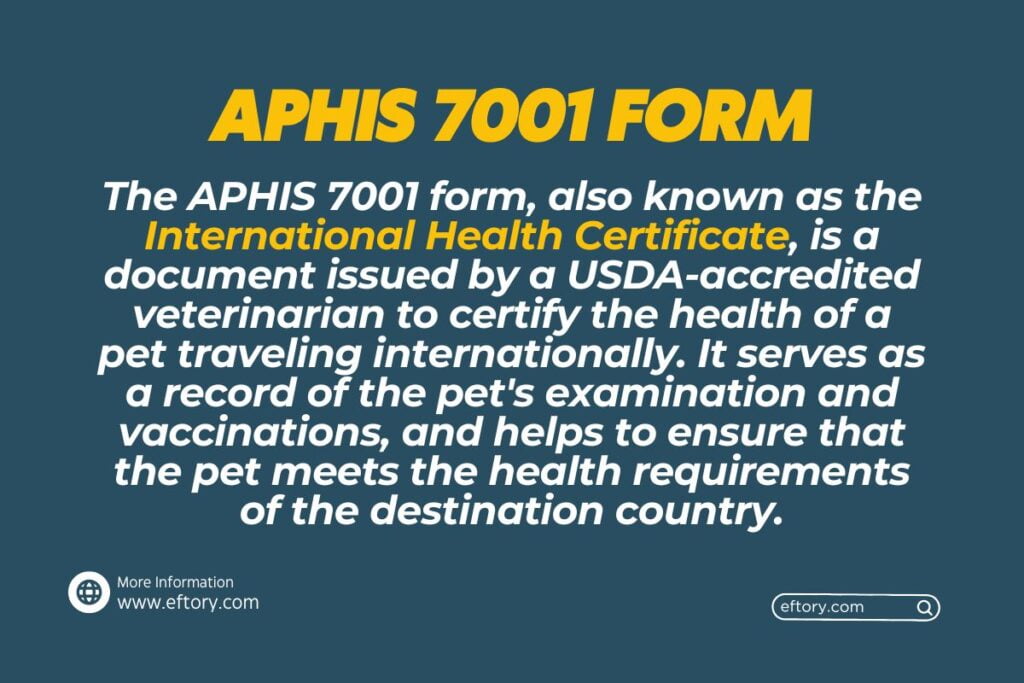
OR
- Complete the application thoroughly.
- Mail the application along with the original health certificate and any required fees to the designated USDA endorsement office serving your state. You can find the address for your state’s office on the USDA Website or by searching the USDA Endorsement office near me:
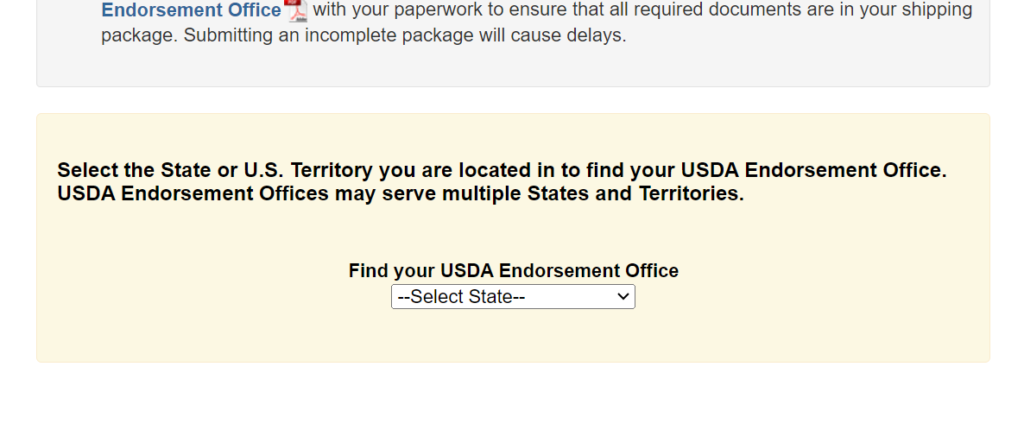
3. Pay the endorsement fee:
- The USDA charges a base endorsement fee, typically around $38 (USD).
- Additional lab test fees might apply depending on the destination country’s requirements. These fees are typically charged by the laboratory performing the tests and not the USDA directly.
4. Processing time:
- Allow a few days to a week for the USDA to process your endorsement application.
5. Receive the endorsed certificate:
- Once approved, you’ll receive the original health certificate with the USDA endorsement stamp from the endorsement office (if submitted directly) or your veterinarian (if they handled the submission).
Airlines Regulations:
- Not all airlines allow pets in the cabin or cargo hold. Research the airline’s pet policy well in advance to ensure they accept cats on your chosen route. Some airlines might have restrictions on certain breeds or snub-nosed cats due to breathing difficulties at high altitudes.
- Airlines might have minimum age requirements for cats traveling (usually around 4 months old). They might also require a health certificate issued within a specific timeframe before departure.
Frequently Asked Questions:
What is an international health certificate for cats?
An international health certificate for cats is essentially a pet passport. It’s an official document issued by a licensed veterinarian that verifies your cat is healthy and meets the specific import requirements of the country you’re traveling to.
What information does a cat’s international health certificate typically include?
Cat’s identification details (species, breed, age, color, microchip number, etc.)
Owner’s information (name, address)
Transport information (origin and destination addresses)
Vaccination details (manufacturer, dates, lot numbers, expiration dates)
How do I get a USDA endorsement on my cat’s health certificate?
Your veterinarian can assist you with the USDA endorsement process. They can:
Complete the endorsement application form.
Submit the application and your cat’s health certificate to the appropriate USDA endorsement office on your behalf.
How long is an international health certificate valid for cat travel?
An international health certificate serves as a current snapshot of your pet’s health at the time of travel. Countries require them to be issued within a specific timeframe (usually days or weeks) before your departure to ensure your pet hasn’t contracted any illnesses between the examination and arrival.
Do I need a USDA endorsement on my cat’s health certificate (for US departures)?
In most cases, a USDA endorsement is needed for pets leaving the US. However, there are a few exceptions:
Traveling to Canada or Mexico: For land travel to Canada or Mexico, a USDA endorsement might not always be necessary. However, it’s still recommended to check with the Canadian Food Inspection Agency (CFIA) or the Mexican Ministry of Agriculture (SAGARPA) for the latest requirements.
Military travel: Active-duty military staff with pets traveling to certain countries (usually with specific prior arrangements) might be exempt from USDA endorsement if a military veterinarian issues and endorses the health certificate.




